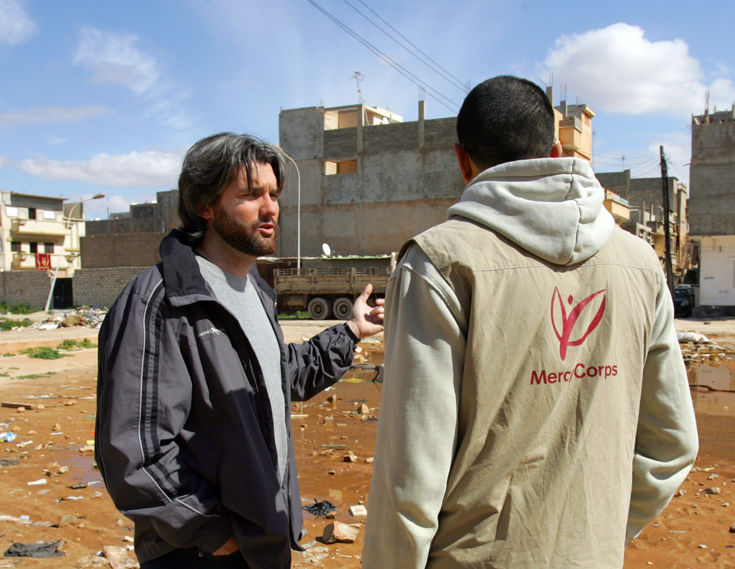Five Questions For… Steve Haley

Mercy Corps’s Steve Haley (left) surveys the scene in the tumultuous Middle East.
Image: Cassandra Nelson
You spent much of spring in Libya, including on the front lines of the civil war. What are you working on?
In Libya, Qaddafi prevented any kind of independent organization from forming. Now people are coming together and saying, “Look, we have this vision for our country, but we need organizational support to make it happen.” Right now, we’re figuring out how to help build civil society.
What is the Western media not reporting about Libya?
Frankly, we’re missing the degree of suffering—especially in a place that’s besieged, like Misurata, where the people live under periodic bombard-?ment and never know where the next rocket is coming from. The media also reports on people shooting at people. It doesn’t talk as much about how Libyans are organizing themselves.
Before Libya, you were in Cairo. Should we be optimistic about Egypt?
If I wasn’t optimistic, I don’t think I could be over here. What’s happening in Libya is exciting, but Egypt is the linchpin for the region. We’re working on projects that can help educated kids find jobs. College graduates have a harder time finding work there than people who didn’t go to college. We’re looking at projects to help small businesses and start-ups. And we’re trying to bridge the gap between Cairo and rural areas.
You grew up in liberal Portland, then were second in your class at West Point and served in Iraq. Is it fair to call you an unusual case?
I was probably the only person at West Point whose family wasn’t absolutely thrilled. In my case it was more like, “… really?” My mom was one of the keynote speakers at a huge Portland antiwar rally in 2004, while I was in Iraq. So it was definitely a departure. But when I looked at colleges, every brochure was the same. West Point was the only one that talked about character. And it was a chance to get out of the track many of us from the Portland suburbs saw ourselves on—college, then a corporate job in Portland or Seattle. There’s nothing wrong with that, but I didn’t see it for myself.
How would West Point surprise Portlanders?
With its diversity of political and social discourse, and its openness. Free-thinking and problem-solving are always encouraged. Bob Dylan played our main auditorium. I went to a recepton for Robert Pirsig, the author of Zen and the Art of Motorcycle Maintenance, and spent hours talking to him about his work and philosophy. Any success I had in the army came out of times when I was willing to be innovative and think outside the box. And after my second or third year, my mom told me West Point was the best decision I ever made. She’s been a big proponent ever since.



